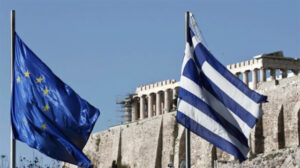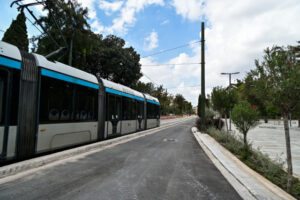In the midst of the general turmoil and the international crisis, the IMF in its annual report yesterday (7/4) from Washington presented the Greek economy as a “good ship” (2.1% growth for 2025, fiscal stability and resilience of the banking system) but warned that exogenous risks (trade wars, international economic slowdown, geopolitical instability and uncertainty) are coming that threaten this positive course.
At the same time in Athens, the government and the prime minister decided that – as in all storms, so in the Trump storm – they should rid the “ship” of weights that threaten its stability: a 25% reduction in bureaucracy, stable rules, enforcement of laws, extroversion, infrastructure projects, electrification that can give new breath and direction against the “winds” of the times. The crucial – and comforting – thing is that this time these are being presented not as mere wishes, but as conditions for survival.
Through “emergency” procedures, the Greek strategy of defence and counter-attack will include interventions in four critical areas, which are interrelated: support and attraction of investments, search for new markets, greater productivity and competitiveness, mobilisation of labour and agricultural potential.
Key to the decisions is growth. If it risks falling and if Greece loses markets, the debt nightmare automatically grows, investment, jobs, wages and wealth in the country are reduced.
On this basis, the Government Economic Policy Council that met yesterday decided to give impetus to:
1. Investment
The initiatives aim to remove obstacles, with the following measures such as:
·Simplification and speed: Simplification of procedures and licensing, reduction of bureaucracy and administrative burdens by 25%, mainly under the responsibility of the Ministry of Development
· Legal Security: Electronic procedures, acceleration of the administration of justice to reach the European average, completion of the Land Registry, digitalization of property transfers, with initiatives of the Ministries of Justice and Digital Governance.
· Clear Rules: Completion of specific spatial planning frameworks (tourism, RES, industry, mineral raw materials) so that investors know where and how they can invest, with actions by the Ministries of Energy and Environment, Tourism, and Industry.
The lag in all these sectors was and is a critical structural problem for the country. Their restoration has always been – rhetorically at least – a goal and a factor of progress. However, when economic borders close, there is no surplus capital and, if they are not addressed, there will be no friendly, safe and flexible environment to attract investments.
2. In Competitiveness and Productivity
It is not enough for the country to attract investments if businesses cannot produce products efficiently and at a lower cost. In this area, the decisions include measures that enhance productivity (i.e. the value that each employee produces in a specific working time), reduce production costs, or increase the level of innovation in the production process. It also includes measures to enhance competition in the market, in the sense that this acts as an incentive for businesses to try to improve the way they produce in order to survive and increase their profitability.
Specifically, priorities are, according to what the KYSOIP decided:
· Energy and Networks: New electricity networks (integration of interconnections in Crete, Cyclades) and expansion of optical fibers for cheaper and faster energy and communication.
· Transportation: Major infrastructure projects (Patras-Pyrgos, E65, Thessaloniki Metro) for faster and cheaper movement and transportation of products and people.
· Modernization of Agricultural Production: Investments in modern greenhouses to increase agricultural productivity, under the responsibility of the Ministry of Rural Development.
3. In extroversion for incentives for the development of Greek businesses abroad
In addition to producing well and cheaply, you need to be able to sell easily abroad. The initiatives here are aimed at removing administrative obstacles, as follows:
· Trade Facilitation: to take shape by 2026 the Roadmap of the Ministry of Finance and the AADE for the digital transformation of customs, Single Window for Foreign Trade (E-trade Single Window), Strengthening Greece’s connectivity with neighboring countries
· Extroverted Agri-Food: Digital transformation of the sector so that Greek agricultural products can reach foreign markets more easily, with initiatives by the Ministries of Rural Development and Digital Governance.
· SME Support: Special program “Extroversion of Small and Medium Enterprises”.
· Incentives for exports by SMEs with the “Extroversion of Small and Medium Enterprises” Program by the Ministry of Finance
4. Increasing participation in the Labor Market
The actions focus mainly on:
· Skills and Participation: Active employment policies and skills upgrading, with an emphasis on women, young people, people with disabilities and older workers, under the responsibility of the Ministry of Labor.
· Work Incentives: Reform of the unemployment benefit to encourage reintegration.
· Training: Special programs for young farmers.
Many of the above have been announced from time to time – including by various governments – but had stalled or lost their momentum and direction. Under the new circumstances, they enter a regime of intensive execution and monitoring of measurable results and with pressure to implement them immediately and efficiently, reminiscent of the mobilization of the state mechanism in times of crisis such as the pandemic, the lockdown and the energy crisis that followed.
Ask me anything
Explore related questions





